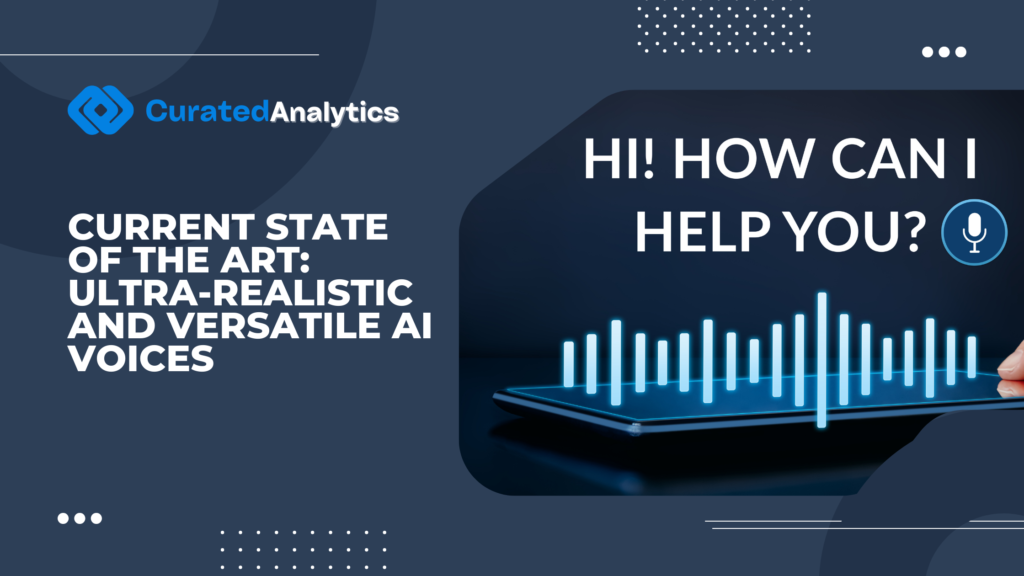The latest advancements in AI voice technology are delivering incredibly realistic and human-like voices. These sophisticated AI voice agents are built upon state-of-the-art machine learning models, trained on vast datasets to replicate the nuances of human speech, including intonation, pacing, and emotion. This progress is fueled by innovations in:
- Text-to-Speech (TTS) Technology: AI voice generators now convert text into natural-sounding speech with remarkable accuracy and speed. Leading platforms like Play.ht offer features such as:
- Expressive Emotional Speaking Styles: Creating engaging voices that sound natural and convey emotion.
- Multi-Voice Feature: Enabling conversational podcasts and multi-speaker experiences.
- Real-Time Conversion: Generating speech with ultra-low latency, suitable for live applications.
- Customization: Allowing users to select from diverse voices and languages, with adjustable pitch and speed.
- Voice Cloning: Replicating voices with stunning accuracy, retaining individual intonation and pacing.
- Conversational AI Engines: Platforms like Agora’s Conversational AI Engine are designed for seamless real-time engagement, ensuring ultra-low latency responses and natural conversation flow. These engines provide developers the flexibility to integrate various AI models and TTS solutions to create interactive voice experiences.
- Cloud-Based Conversational AI Platforms: Google Cloud Dialogflow offers a comprehensive development platform for building text and voice-based virtual agents. Key features include:
- Generative AI Agents: Enabling the creation of virtual agents with minimal coding, leveraging foundation models for content generation and contextual responses.
- Multimodal Conversations: Supporting interactive visual interfaces during voice sessions, allowing users to share input via text, images, and visual elements.
- Omnichannel Implementation: Seamlessly integrating agents across web, mobile, and messenger platforms.
Available Solutions: Applications Across Industries
AI voice agents are finding practical applications across diverse industries, enhancing user experiences and automating tasks. Some prominent examples include:
- Customer Service: AI voice agents are revolutionizing customer service by handling inquiries efficiently, reducing wait times, and improving customer satisfaction. They can provide personalized and natural conversational experiences, powered by advanced Language Learning Models (LLMs) and high-fidelity TTS.
- Virtual Assistants: AI voice agents act as virtual assistants, managing schedules, setting reminders, answering questions, and providing recommendations through spoken language.
- Content Creation: AI voice agents are streamlining content creation for:
- Voiceovers for Videos: Powering marketing, explainer, product demo, and YouTube videos with clear and consistent voiceovers.
- Narration: Narrating audiobooks and e-learning materials with ultra-realistic voices.
- Podcasts: Creating engaging, multi-speaker, conversational podcasts.
- Dubbing: Localizing video and voice content into multiple languages for a global audience.
- Gaming: AI voice agents enhance gaming experiences by:
- Streamlining game pre-production with realistic placeholder voice acting.
- Creating immersive virtual worlds with AI-controlled characters that interact naturally with players via voice.
- Accessibility: Integrating human-like voices in assistive voice devices and applications to enhance accessibility for users.
- Interactive Voice Response (IVR) Systems: Automating IVR system voice responses to revolutionize customer experience with seamless, personalized interactions.
- IoT Integration: Enabling voice control for smart devices, wearables, robots, and connected applications.
Innovative Ideas and Future Trends
Looking ahead to 2025 and beyond, the field of AI voice agents is brimming with innovative ideas and exciting future trends:
- AI Teammates: AI voice agents are evolving into “AI teammates” that can participate in meetings, understand context, ask questions, and take action items, becoming integral parts of teams.
- Enhanced Customer Relationships: AI voice agents are being developed with enhanced emotional intelligence to build deeper relationships with customers. They can offer improved empathy, patience, and attentiveness compared to human agents.
- AI Voice Interviewers: AI voice agents are being used for initial candidate screenings, improving efficiency and candidate experience in the hiring process.
- Live AI Hosts: AI agents are being explored for hosting live events, equipped with automated content moderation and real-time interaction capabilities.
- AI Tutors: AI voice agents can provide personalized tutoring, offering real-time feedback and guidance to students learning languages or subjects.
- Mental Health Support: AI voice agents are being considered for providing mental health support, offering a listening ear and connecting users with professional help when needed.
The voice agent market is experiencing rapid growth, with significant investments and increasing adoption across various sectors. As highlighted in Andreessen Horowitz’s 2025 update on AI Voice Agents, companies building with voice are becoming increasingly prevalent, particularly in B2B and healthcare applications.
Questions for the Future:
As AI voice agents continue to evolve, key questions remain:
- Pricing Models: What will be the preferred and sustainable pricing models for voice agent services?
- Modality Expansion: How quickly will voice agent companies expand beyond voice-only interactions to multi-modal experiences?
- Emotionality: How will the emotional capabilities of AI voice agents develop, and how will this impact customer relationships?
- Industry vs. Horizontal: Will verticalized or horizontal platforms dominate the voice agent landscape?
Conclusion
AI voice agents have reached a state where they offer ultra-realistic and versatile solutions for a wide range of voice-driven applications. From enhancing customer service and automating tasks to creating immersive content and providing personalized support, AI voice agents are transforming how we interact with technology. As innovation continues, we can expect even more sophisticated and emotionally intelligent voice agents to emerge, unlocking new possibilities and shaping the future of human-computer interaction.
Further Reading and Next Steps
Start with a solid foundation by learning why robust AI infrastructure matters. For a broader view of agent capabilities, understand what AI agents are. See community impact in action with AI agents supporting community schools.

